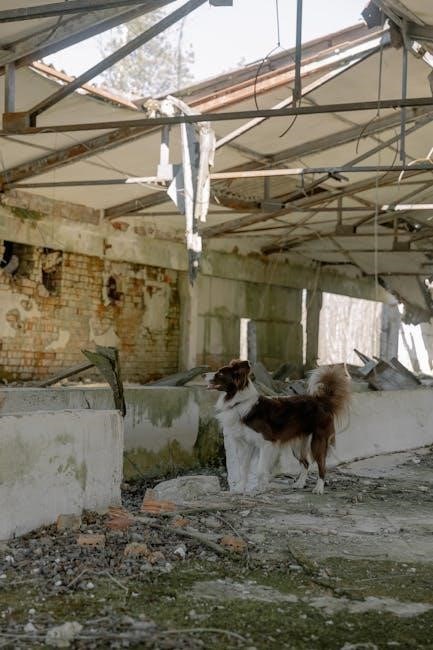E.B. Sledge’s memoir vividly captures the brutal realities of WWII’s Pacific Theater, offering a raw, unglorified account of combat at Peleliu and Okinawa, profoundly impacting military literature.
1.1 Overview of E.B. Sledge’s Memoir
E.B. Sledge’s With the Old Breed: At Peleliu and Okinawa is a gripping first-person account of the author’s experiences as a Marine in World War II. The memoir vividly recounts Sledge’s harrowing journey through the brutal battles of Peleliu and Okinawa, offering a raw, unfiltered perspective on combat. Sledge’s narrative captures the chaos, horror, and camaraderie of war, providing a deeply personal and historical insight into the Pacific Theater. His vivid descriptions of the physical and mental toll of warfare make the book a masterpiece of military literature.
1.2 Historical Context of the Pacific Theater in WWII
The Pacific Theater in WWII was marked by brutal island-hopping campaigns as Allied forces sought to liberate territories from Japanese control. Battles like Peleliu and Okinawa were pivotal, as they provided strategic airbases for bombing mainland Japan. These campaigns were characterized by intense fighting, harsh tropical conditions, and heavy casualties on both sides. Sledge’s memoir captures the grueling reality of these battles, offering a soldier’s perspective on the broader historical significance of the Pacific War and its impact on the outcome of WWII.
1.3 Significance of the Book in Military Literature
With the Old Breed stands as a masterpiece in military literature, offering an unflinching account of WWII’s Pacific Theater. Sledge’s raw, personal narrative provides unparalleled insight into the psychological and physical toll of combat, transcending typical war stories. Its vivid descriptions and honest portrayal of soldiers’ experiences have made it a required read for military professionals and historians, influencing both strategy and education. The book’s acclaim lies in its ability to convey the human cost of war, resonating across generations and solidifying its place as a seminal work.
The Author and His Experience
E.B. Sledge, an Alabama native and Marine Corps veteran, recounts his harrowing WWII experiences in the 1st Marine Division, offering a deeply personal and influential account.
2.1 E.B. Sledge’s Background and Enlistment

E.B. Sledge, born in 1923 in Alabama, grew up with a deep appreciation for American history and heroes. Inspired by figures like George Washington, he developed a strong sense of duty. Sledge enlisted in the Marine Corps in 1942, during World War II, seeking to contribute to the war effort. His education at Marion Military Institute prepared him for military life, and he quickly adapted to the rigorous training. Sledge’s enlistment marked the beginning of his transformative journey as a Marine infantryman.
2.2 The 1st Marine Division: Sledge’s Unit and Comrades
E.B. Sledge served in the 1st Marine Division, a prestigious unit known for its bravery in the Pacific Theater. He was part of the 3rd Battalion, 5th Marines, where camaraderie and shared hardships forged strong bonds among soldiers. The division’s relentless fighting spirit and sacrifices during Peleliu and Okinawa campaigns are central to Sledge’s narrative. His memoir highlights the unity and reliance on comrades, which were crucial for survival in the intense combat environments they faced.
2.3 Personal Reflections on Combat and Survival

E.B. Sledge’s memoir delves into his personal reflections on combat and survival, vividly depicting the psychological and physical toll of war. He recounts the harrowing experiences of enduring brutal battles, the constant fear of death, and the struggle to maintain humanity amidst chaos. Sledge’s narrative emphasizes the importance of mental resilience and camaraderie, while also expressing his deep respect for the sacrifices made by his fellow soldiers. His reflections provide a poignant insight into the true cost of war on the individual soldier.

The Campaigns of Peleliu and Okinawa
The battles of Peleliu and Okinawa were pivotal in WWII, marked by intense combat and high casualties, as Allied forces secured strategic islands in the Pacific.
3.1 Strategic Importance of the Islands
Peleliu and Okinawa were critical to Allied strategy in WWII, serving as vital bases for advancing toward mainland Japan. Their capture provided essential airbases and staging areas for future operations, while neutralizing Japanese strongpoints. The islands’ strategic locations allowed the Allies to project power deeper into the Pacific, making them indispensable for the war’s final phases. Their seizure was a key step toward isolating Japan and preparing for a potential invasion, highlighting their importance in the broader Pacific Theater campaign.
3.2 The Brutality of Combat: A Soldier’s Perspective
E.B. Sledge’s memoir vividly captures the relentless brutality of combat at Peleliu and Okinawa. The visceral descriptions of artillery barrages, close-quarters fighting, and the stench of death provide a harrowing soldier’s-eye view. Sledge recounts the psychological toll of constant fear, the dehumanizing effects of prolonged combat, and the moral struggles of survival. His account strips away romantic notions of war, revealing the raw, savage reality endured by infantrymen in the Pacific Theater, leaving an indelible impression of war’s true cost.
3.3 Military Tactics and Challenges Faced

The U.S. military faced significant tactical challenges in Peleliu and Okinawa, as described by Sledge. Poor intelligence and overconfidence led to underestimating enemy strength, while terrain like caves and tunnels allowed Japanese forces to employ effective guerrilla tactics. Sledge highlights the relentless artillery bombardments, amphibious assaults, and the strain on supply lines. The Marines’ reliance on firepower and attrition warfare, though ultimately successful, came at a high cost in lives, exposing the harsh realities of island hopping in the Pacific.

The Psychological and Physical Toll of War
Sledge vividly describes the mental and physical exhaustion of soldiers, revealing the profound impact of relentless combat in tropical environments on their well-being and resilience.
4.1 Mental Struggles of Infantrymen

The psychological toll of war on infantrymen in With the Old Breed is starkly evident. Sledge vividly portrays the relentless anxiety, fear, and despair faced by soldiers in the Pacific Theater. The constant exposure to death, the stench of decay, and the chaos of battle took a profound mental toll. Many struggled with what Sledge termed “combat fatigue,” a breakdown of mental resilience under unbearable stress. The memoir highlights the emotional scars left by the loss of comrades and the moral dilemmas of survival in a brutal, unforgiving environment.
4.2 Physical Hardships in Tropical Environments
The tropical environments of Peleliu and Okinawa subjected soldiers to extreme physical hardships. Sledge vividly describes the relentless heat, humidity, and dense jungles that made movement arduous. The terrain, combined with constant dampness, led to trench foot, skin infections, and other health issues. Soldiers also endured vermin-infested foxholes and the stench of rotting bodies, creating unbearable living conditions. These physical challenges compounded the psychological toll, making survival a daily struggle in one of the most hostile combat environments of WWII.
4.3 The Impact of War on Civilian Populations
The memoir highlights the devastating impact of war on civilians during the Pacific campaigns. Okinawa’s local population faced immense suffering, with many caught in the crossfire or forced to flee their homes. Sledge recounts the tragic fate of civilians, including women and children, who were often trapped between advancing forces and retreating armies. The destruction of infrastructure and loss of life left deep scars, vividly illustrating the human cost of war beyond the battlefield, as documented in Sledge’s harrowing narrative.
Themes and Messages in the Memoir
E.B. Sledge’s memoir explores themes of camaraderie, survival, and the psychological toll of war, emphasizing the human cost and the harsh realities of combat.
5.1 The Reality of War: Beyond Glory and Heroism
E.B. Sledge’s memoir strips away romantic notions of war, revealing its raw brutality. He vividly describes the sensory horrors of combat, from the stench of decay to the chaos of battle, emphasizing the dehumanizing effects of war. Sledge’s account underscores the psychological and physical toll on soldiers, highlighting the survival instincts that replace ideals of heroism. His narrative challenges glorified notions of warfare, offering a stark reminder of its grim realities and the sacrifices made by ordinary men in extraordinary circumstances.
5.2 Camaraderie and Sacrifice Among Soldiers
E.B. Sledge’s memoir vividly portrays the deep bonds of camaraderie among soldiers, forged through shared hardships and the constant threat of death. The mutual reliance and trust between Marines became their lifeline, fostering an unbreakable sense of brotherhood. Sledge highlights acts of selfless sacrifice, where men risked their lives to protect comrades, underscoring the moral and emotional support that sustained them. These relationships, built on loyalty and shared survival, are a testament to the enduring spirit of soldiers in the face of overwhelming adversity.

5.3 The Human Cost of War and Its Legacy
E.B. Sledge’s memoir vividly captures the profound psychological and physical toll of war on soldiers, detailing the moral dilemmas, exhaustion, and trauma they endured. The book also highlights the suffering of civilians caught in the crossfire, offering a poignant reminder of war’s devastating impact on humanity. Sledge’s account serves as a legacy, preserving the memories of those who sacrificed everything and influencing future generations to reflect on the true cost of conflict and its lasting effects on individuals and society.

Reception and Influence of the Book
With the Old Breed received widespread critical acclaim for its raw, unflinching portrayal of war, influencing military education and strategy while remaining a timeless, deeply impactful read.
6.1 Critical Acclaim and Reviews
E.B. Sledge’s memoir has garnered widespread critical acclaim for its unflinching portrayal of war. Critics praise its vivid, harrowing descriptions of combat, calling it a masterpiece and one of the most haunting accounts of the Pacific Theater. The New York Review of Books hailed it as the closest to a masterpiece among WWII ground war books, while The Wall Street Journal highlighted its visceral detail and emotional depth. Its raw honesty has made it a benchmark for military memoirs, resonating with readers and scholars alike.

6.2 Impact on Military Education and Strategy
E.B. Sledge’s memoir has significantly influenced military education and strategy, offering unparalleled insights into the psychological and physical challenges of combat. It is included in the Marine Corps’ required reading list, emphasizing the importance of realistic training and leadership. The book’s detailed accounts of tactics and command decisions provide valuable lessons for military strategists. By highlighting the human cost of war, it underscores the need for empathy and preparedness in modern military training, shaping both doctrine and the mindset of future officers. Its influence remains profound and enduring in military circles.
6.3 Popularity and Relevance in Modern Times
E.B. Sledge’s memoir remains widely acclaimed and relevant today, resonating with new generations. Its inclusion on the Marine Corps’ required reading list ensures its influence endures. The book’s vivid portrayal of war continues to captivate readers, offering timeless lessons on survival, camaraderie, and the human cost of conflict. Modern audiences appreciate its unflinching honesty, making it a vital resource for understanding WWII’s Pacific Theater. Its popularity underscores the enduring need to reflect on war’s realities and their lasting impact on individuals and society.
